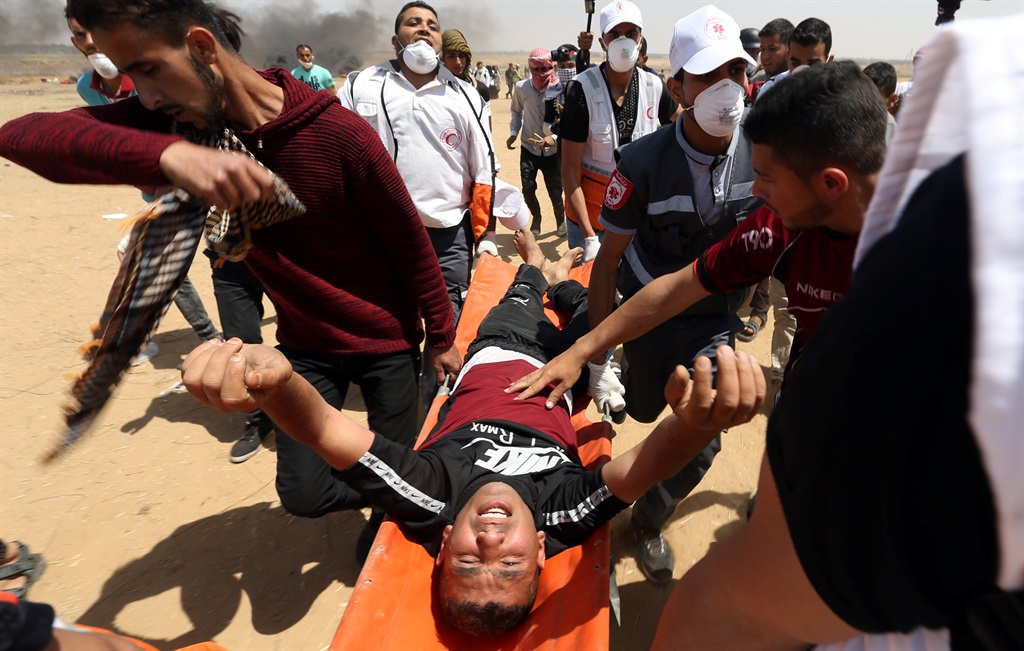
Seven decades after the Nakba, Palestinians want nothing more than to return to their land and live in dignity.
Two million Palestinians in the Gaza Strip are slowly being suffocated. More than 40% of Gazans are unemployed; there is virtually no economy; no electricity; the water is undrinkable; and the medical system has collapsed. It is the Israeli occupation that is responsible for the suffering of Palestinians in Gaza due to its 11-year siege imposed on the coastal enclave.
Since 2007, following Hamas’s victory in the internationally-monitored elections, Israel has retained absolute control over the movement of people and goods via Gaza’s airspace, territorial waters, and land borders. This blockade subjects Gaza’s population to collective punishment, in contravention of international law.
Confronted with such oppression, and the world’s silence in response to Israeli war-crimes, Palestinians in Gaza have no other option than to raise their voices in protest. Seventy percent of Gaza’s population are refugees, or descendants of refugees, who were violently expelled from their homeland in 1948 to make way for the Zionist state of Israel. Israelis celebrate this land-grab as “independence” but for Palestinians it is the Nakba (catastrophe).
We, the Palestinians, have never been allowed to return to our land, despite United Nations General Assembly Resolution 194 guaranteeing us this inalienable right. In the Israeli apartheid state, Palestinians are stripped of their humanity; their identity reduced to that of “demographic threat”.
Since March 30, thousands of Palestinians have been participating in the Great Return March (GRM), sending a united message to Israel and the world: We have the right to return to our homeland that was stolen from us in 1948. We have the right to move freely, to have electricity, to travel, to work. Through the GRM movement, Palestinians are not only demanding the right to return but also the right to live.
The GRM is not Hamas-driven; it is Palestinian-inspired and driven. It is the embodiment of Palestinian popular resistance involving youth, women, and all Palestinians that steadfastly refuse to collaborate with the occupiers, accept Israeli occupation and submit to Zionist apartheid. They are fighting back, armed only with their rights and international law.
The GRM also shows that the Palestinian people are determined to achieve their freedom, their independence, and their right to return to the villages that they were forced out of 70 years ago.
These protests have also shown the world the brutality of the Israeli occupation government. Israeli forces use jeeps and drones to fire teargas at paramedics and children. Dozens of snipers, armed with internationally-prohibited explosive bullets designed to permanently maim, have been stationed along the border, targeting and killing unarmed protesters like 15-year old Mohammed Ibrahim Ayoub, and journalists Yasser Murtaja and Ahmed Abu Hussein. Israeli bullets have, so far, killed 50 Palestinians and injured more than 7000 people over the last six weeks.
By killing and wounding so many, Israel had hoped that the masses would retreat, that the protests would subside and, eventually, end. This was not the case, and popular resistance will intensify as we approach May 15, the 70th anniversary of the Nakba.
Like the apartheid South African government, Israel justifies decades of state terrorism by criminalising legitimate resistance movements. If Hamas was not established until 1987, then what explains the ongoing ethnic cleansing of Palestinians since 1948? Why did Israel occupy the Gaza Strip, West Bank and East Jerusalem in 1967?
What explains Israeli settler takeovers, Palestinian home demolitions, forced displacement, disproportionate use of force, detention without trial, arrest without due process, denial of entry, land confiscations, and movement restrictions against Palestinians for over 50 years? Israel can no longer rationalise its oppression of Palestinians.
The GRM is a turning point, just as the 1960 Sharpeville massacre was a turning point in South Africa’s liberation struggle. In Gaza, the world is witnessing an apartheid military regime killing unarmed protesters. The world did not look away from Sharpeville, and it must not look away from occupied Palestine either. The Palestinian call for justice, freedom and dignity must be heard and respected.
Mousa Abu Marzouq is a member of the politburo of the Hamas Movement.




 Publications
Publications
 Partners
Partners








